What Are Phrasal Verbs?
Phrasal verbs are phrases that consist of a verb and one or more particles, which can be prepositions or adverbs. Together, they form a new meaning that is often unpredictable from the individual words. Understanding Phrasal verbs definition and Examples is crucial for students because they are commonly used in both spoken and written English.
Types of Phrasal verbs definition and Examples
There are generally two types of phrasal verbs:
- Transitive Phrasal Verbs: These require a direct object. For example, “She turned off the lights.” Here, lights is the object.
- Intransitive Phrasal Verbs: These do not require an object. For example, “The car broke down.” No object is needed here.
Transitive Phrasal verbs definition and Examples
Transitive phrasal verbs take a direct object, meaning they are used with nouns or pronouns that receive the action. These phrasal verbs often have separable or inseparable forms.
- Separable Phrasal Verbs: The object can be placed between the verb and the particle.
Example: Turn off the lights or Turn the lights off. - Inseparable Phrasal Verbs: The object must follow the phrasal verb and cannot be placed between the verb and the particle. Example: Look after the children (not Look the children after).
| Phrasal Verb | Meaning | Example Sentence |
|---|---|---|
| Turn off | To stop something from working | She turned off the television. |
| Put on | To wear something | He put on his jacket before leaving. |
| Take off | To remove something | Please take off your shoes. |
| Give up | To quit or stop doing something | She gave up smoking last year. |
| Look after | To take care of | I’ll look after the kids tonight. |
Intransitive Phrasal verbs definition and Examples
Intransitive phrasal verbs do not need an object and usually convey actions that happen by themselves.
Here are some common examples:
| Phrasal Verb | Meaning | Example Sentence |
|---|---|---|
| Break down | To stop working | My car broke down yesterday. |
| Grow up | To become an adult | He grew up in a small village. |
| Show up | To appear or arrive | She showed up late to the party. |
| Wake up | To stop sleeping | I woke up at 7 AM today. |
| Calm down | To become relaxed | He needs to calm down after the argument. |
Separable vs. Inseparable Phrasal Verbs: How to Use Them
Let’s break down the difference between separable and inseparable phrasal verbs with examples:
Separable Phrasal Verbs
In separable phrasal verbs, the object can be placed between the verb and the particle. If the object is a pronoun (e.g., it, them), it must be placed between the verb and the particle.
Example:
- Turn off: Please turn off the fan or Please turn it off (but not turn off it).
Inseparable Phrasal Verbs
In inseparable phrasal verbs, the object always comes after the entire phrasal verb. You cannot separate the verb from the particle.
Example:
- Look after: She looks after her sister (not looks her after).
Common Phrasal verbs definition and Examples in Daily Use
Phrasal verbs are used frequently in everyday English. Below is a table of some of the most common phrasal verbs with meanings and example sentences.
| Phrasal Verb | Meaning | Example Sentence |
|---|---|---|
| Get along | To have a good relationship | They get along well with each other. |
| Find out | To discover or learn something | I found out the truth yesterday. |
| Look up | To search for information | He looked up the word in the dictionary. |
| Run into | To meet someone by chance | I ran into an old friend at the mall. |
| Take care of | To look after someone or something | She takes care of her little brother. |
Phrasal Verbs for Advanced Learners
As learners advance in English, they’ll encounter more complex phrasal verbs that are often used in professional or academic settings. Here are some advanced phrasal verbs and how they can be used.
| Phrasal Verb | Meaning | Example Sentence |
|---|---|---|
| Bring up | To introduce a topic or issue | He brought up the subject at the meeting. |
| Carry out | To execute or complete a task | The team carried out the research. |
| Set up | To arrange or establish something | They set up a new company. |
| Look forward to | To be excited about a future event | I look forward to our next meeting. |
| Put off | To delay or postpone | They put off the project until next week. |
Phrasal Verbs vs. Single Verbs
One of the challenges for ESL students is understanding when to use a phrasal verb versus a single verb. Many phrasal verbs have single-verb equivalents, but the choice depends on the context. Often, phrasal verbs are used in informal speech, while single verbs are more common in formal writing.
Here’s a comparison:
| Phrasal Verb | Single Verb Equivalent | Example Sentence |
|---|---|---|
| Give up | Quit | He gave up smoking. |
| Come across | Discover | She came across an old book. |
| Set up | Establish | They set up a new system. |
| Look into | Investigate | The police are looking into the case. |
Tips for Learning Phrasal Verb
- Practice in Context: Learning phrasal verbs through sentences is more effective than memorizing them in isolation. Try using them in real-life situations.
- Group by Theme: Group phrasal verbs with similar meanings or by context, such as travel-related phrasal verbs (e.g., set off, take off).
- Use Flashcards: Create flashcards with the phrasal verb on one side and the meaning and an example sentence on the other.
- Watch Native Content: Watching movies, TV shows, or listening to podcasts can expose you to the natural use of phrasal verbs.
Phrasal verbs Example Sentences
| Phrasal Verb | Example Sentence |
|---|---|
| Break down | The car broke down yesterday. |
| Look after | She looks after her little brother. |
| Turn off | Please turn off the lights. |
| Run into | I ran into my old teacher today. |
| Give up | He gave up smoking last year. |
| Pick up | She picked up the phone quickly. |
| Put on | He put on his jacket before leaving. |
| Take off | The plane took off on time. |
| Look for | I am looking for my keys. |
| Turn on | She turned on the TV to watch the news. |
| Come across | I came across an old photo. |
| Get up | He gets up at 6 AM every day. |
| Set up | They set up a new business. |
| Bring up | She brought up an interesting point. |
| Take after | She takes after her mother. |
| Show up | He showed up late for the meeting. |
| Work out | They work out every morning. |
| Turn down | He turned down the job offer. |
| Calm down | She needs to calm down after the argument. |
| Wake up | I woke up at 7 AM. |
List of Phrasal verb in English
- Break down
- Look after
- Turn off
- Run into
- Give up
- Pick up
- Put on
- Take off
- Look for
- Turn on
- Come across
- Get up
- Set up
- Bring up
- Take after
- Show up
- Work out
- Turn down
- Calm down
- Wake up
Learn Also:

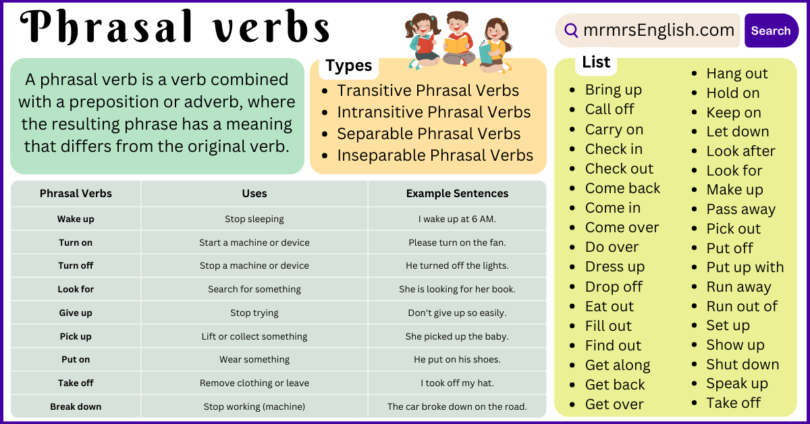
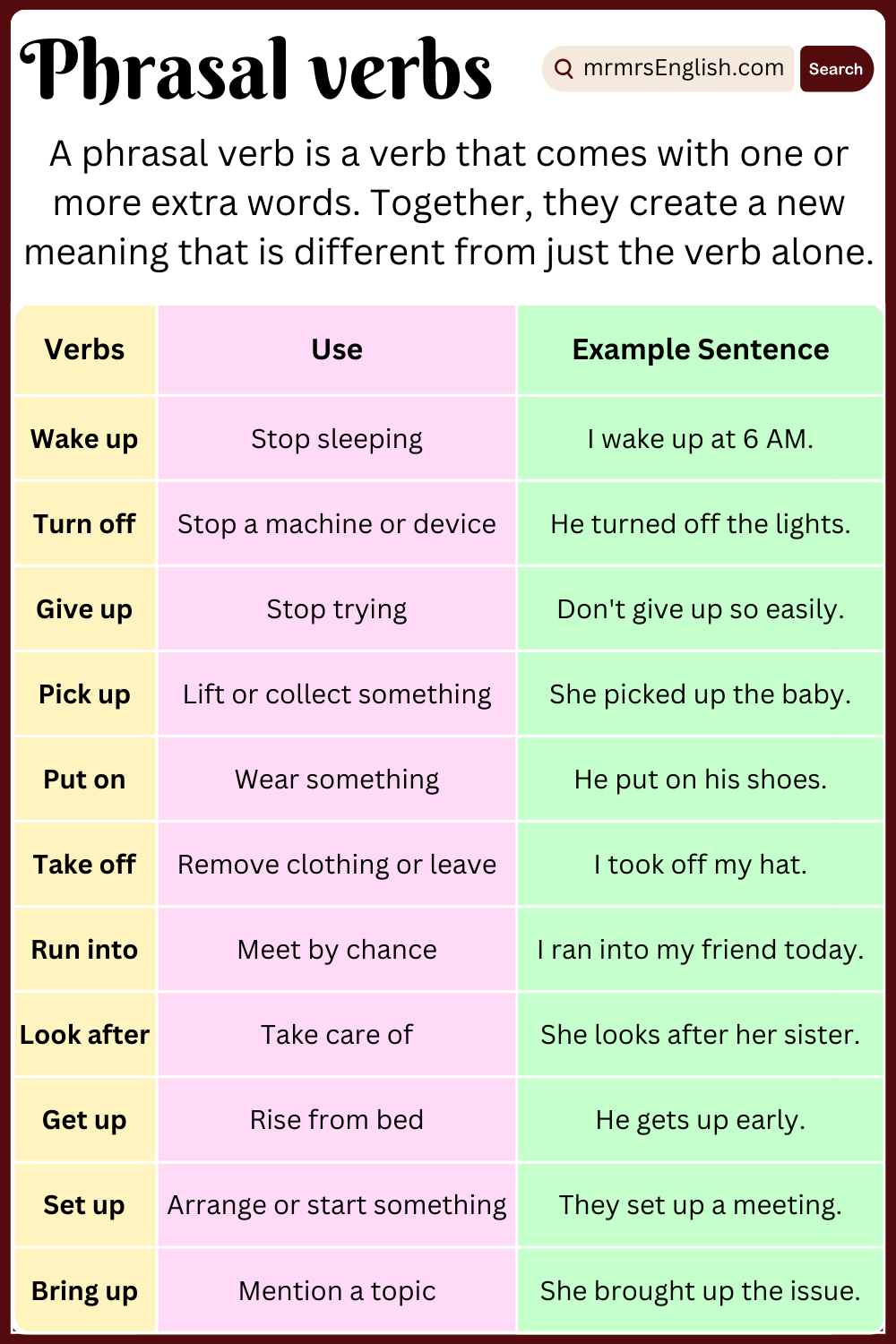



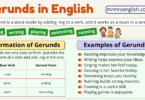
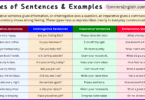
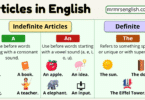
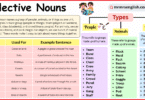
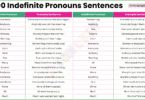
Leave a Comment